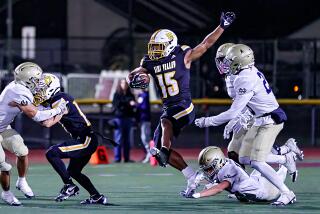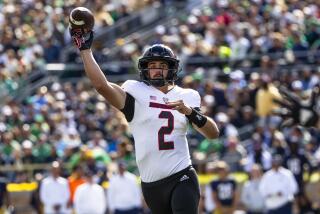Less Than Perfect
Notre Dame’s struggles this season are magnified by the legacy of success that routinely accompanies the Fighting Irish. No college football team has won more national championships. No school has had more Heisman Trophy winners.
The Irish got both in 1943, a perfect season until a galling defeat at the end, one of the most troubling losses in the long, brilliant reign of coach Frank Leahy.
World War II stripped college football of its best players and many of them surfaced playing for military-base teams. Those squads often played college teams and it was not unusual for them to be ranked in The Associated Press poll.
Notre Dame lost its share of players to the war effort, with just two starters back from the 1942 team. One of them was Angelo Bertelli, who switched from single wing tailback to quarterback when Leahy went to the T-formation.
Bertelli threw 10 touchdown passes and the team averaged 43.5 points in just six games before he headed for Marine Corps boot camp. He was replaced by sophomore Johnny Lujack, who doubled as a defensive back in that era of two-way players.
Despite playing seven of their 10 games on the road, the Irish flourished that season. There were four shutouts and consecutive victories over Navy and Army. They had outscored opponents, 312-37, and were 8-0 and No. 1 in the country when they edged No. 2 Iowa Pre-Flight, 14-13, in the next-to-last game.
One game to go, this one against Great Lakes Naval Training Station.
In the days before the final game, Capt. R.R.M. Emmett, commandant of Great Lakes, received a note from Capt. David Hanrahan, who headed Iowa Pre-Flight. “We’ve softened them up for you,” Hanrahan wrote. “Now it’s up to your Great Lakes boys.”
The game was supposed to be played at Comiskey Park in Chicago on Thanksgiving, but the Rev. J. Hugh O’Donnell, president of Notre Dame, suggested moving it to Great Lakes on Saturday so that the men serving at the Naval base could see it. The gesture cost the university’s athletic department about $50,000.
For Notre Dame, this was like an intrasquad game. Great Lakes had a number of Irish players, including Emil Sitko, Mike Romano, Steve Juzwik and Pete Kelly. The quarterback was Steve Lach from Duke. These were quality players. Both Sitko and Lach would wind up in the College Football Hall of Fame.
On this day, Sitko ran for 114 yards and Dewey Proctor from Furman rushed for 155 more, each on 17 carries.
As the game wound down, Notre Dame trailed, 12-7, after failing to score in the third quarter for the first time all season. But the Irish went on an 80-yard drive in the fourth and Creighton Miller scored the go-ahead touchdown with 65 seconds left.
Lujack, who scored the first Irish TD in the first quarter, remembered the one that seemed to be the game-winner. “It was a lot of hard work,” he said. “There was a fourth-and-one, a fourth-and-two, but we made it.”
Now, the Irish led, 14-12. The perfect season was in sight.
Notre Dame’s kickoff went out of bounds on the Great Lakes 39. On first down, Lach threw 15 yards to Cecil Pirkey of East Texas State, moving the ball to Notre Dame’s 46. With 33 seconds left, Lach went back for another pass.
Lujack, in the Notre Dame secondary, remembered how the play unfolded.
“We had him tackled two or three times in the backfield,” he said. “He started to run and we moved up.”
With the Irish defensive backs out of position, Lach spotted Paul Anderson, who had played at Western Reserve, springing free. He lofted a pass over the Notre Dame defenders. Anderson caught it at the 6-yard line and easily outran Julie Rykovich to the end zone.
Final score: Great Lakes 19, Notre Dame 14.
That quickly, the perfect season was over. In the dressing room, Leahy tried to console his team.
“You’re still champions to me, boys,” he told them. “You fought your hearts out every inch of the way in the greatest drive I’ve ever seen.”
Despite the defeat, the Irish topped the final writers poll, their first AP national championship.
Still, the loss hurt. In boot camp at Parris Island, S.C., Bertelli listened to the game on a radio. When Great Lakes scored the winning touchdown, he walked out of his barracks, crestfallen.
Just then, another Marine rushed up to him with the news. He had just become Notre Dame’s first Heisman Trophy winner.
Four years later, after Lujack returned from the war, he became the second.
More to Read
Go beyond the scoreboard
Get the latest on L.A.'s teams in the daily Sports Report newsletter.
You may occasionally receive promotional content from the Los Angeles Times.










